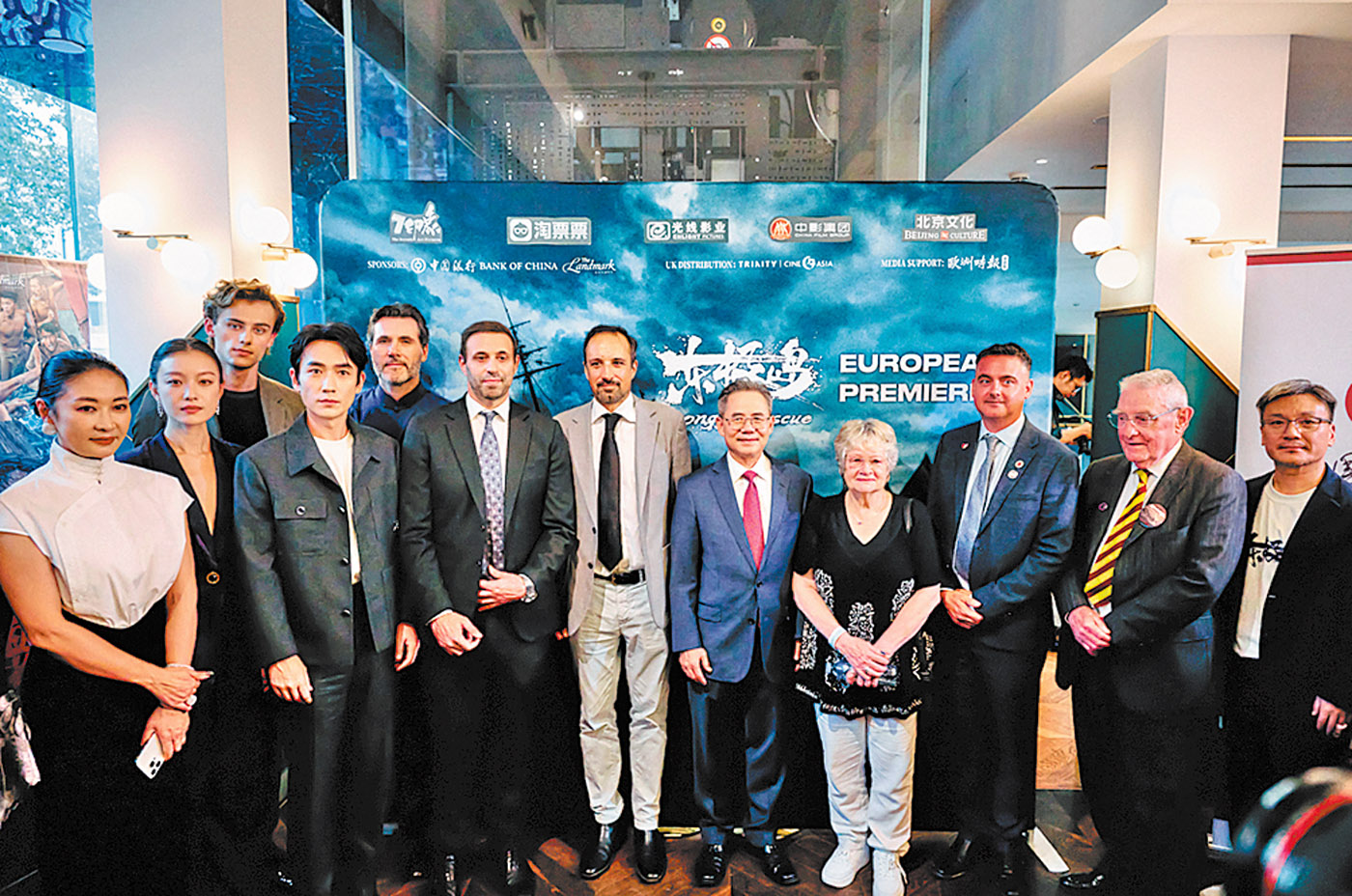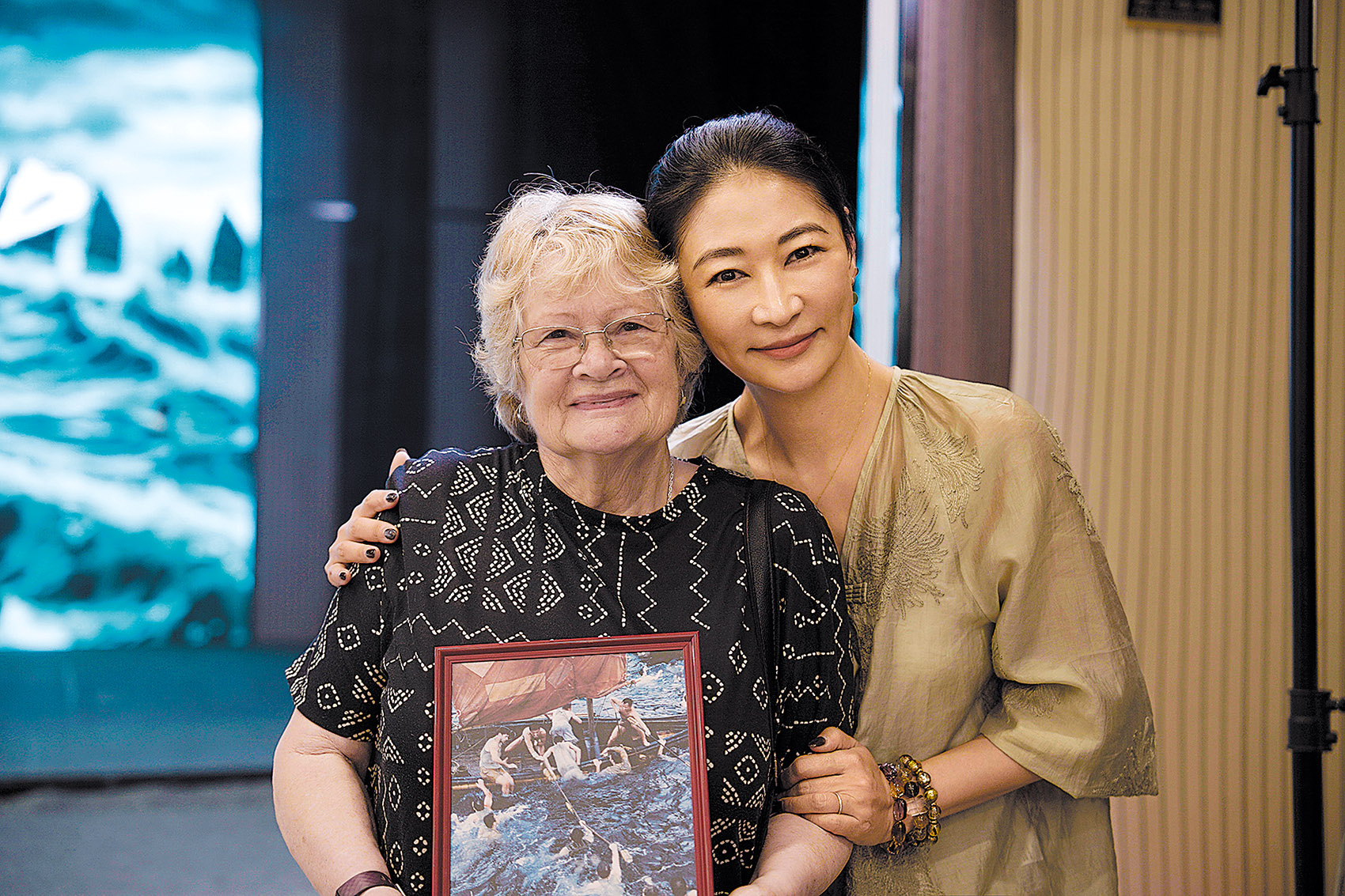Brave Chinese fishermen who saved British POWs in 1942 honored in new films, events

Editor’s note: This year marks the 80th anniversary of the victory in the Chinese People’s War of Resistance Against Japanese Aggression (1931-45) and the World Anti-Fascist War. This series of special reports by China Daily presents how and why China cherishes and keeps revisiting the wartime friendship with its foreign friends.
Denise Wynne, a 76-year-old British woman, has long called for raising public awareness on a Japanese wartime atrocity and the Chinese people’s rescue of prisoners of war, including her father, from a sinking ship in 1942.
That October, the Lisbon Maru, a cargo vessel requisitioned by the Japanese army to transfer more than 1,800 British POWs from Hong Kong to Japan, was torpedoed by US forces off Dongji Island of Zhoushan in Zhejiang province.
As the ship started to sink, Japanese soldiers tried to prevent their prisoners from escaping, before abandoning the ship. Over 800 British POWs drowned or were shot dead by the Japanese troops, and Chinese fishermen risked their lives and saved 384 British POWs.
Wynne’s father, Dennis Morley, passed away in 2021, and she noted that he was the last survivor of the Lisbon Maru. “Before he died, he told me to honor the Dongji fishermen on his behalf,” Wynne said.
“My father was very emotional to think of all the POWs being trapped below deck, and the ship was sinking. Then to finally escape and jump into the sea to be shot by the Japanese!” she wrote in a letter sent to the production team of Dongji Rescue, a movie that recalls the Lisbon Maru incident now showing in China.
“My dad remembered the Chinese fishermen as being angels coming along to rescue them all out of the hell, because he said it really was a hell,” she said.
During his state visit to Britain in 2015, President Xi Jinping used the Chinese fishermen’s rescue of POWs on the Lisbon Maru as an example, stressing that the friendship forged by the Chinese and British people during the war will never fade, and become a cherished asset in bilateral ties.
In 2022, Wynne wrote to Xi to express her support for building on the friendship between generations of British and Chinese people.
Wynne’s letter suggested a monument be built in Zhoushan to allow people to pay tribute to the brave Chinese fishermen and the British soldiers who died.
Xi, in a reply letter, encouraged family members of the survivors to further advance bilateral friendship. He told Wynne that he had instructed relevant departments to explore her proposed rescue monument in Zhoushan.
In May, Wynne attended the unveiling of the Memorial for Dongji Fishermen’s Rescue of British Prisoners of War, in Zhoushan.
Wynne said she was moved to tears when she opened Xi’s reply, expressing her appreciation for Xi’s honoring of his words. “I’m very honored that he replied to me. President Xi said he would look into it, and … he has done it,” she said.
Zheng Zeguang, Chinese ambassador to the UK, met Wynne at her home in 2022 to deliver Xi’s reply letter to her.
Zheng also attended events related to the Lisbon Maru, including a Spring Festival reception hosted by the Chinese embassy in the UK for the families of Lisbon Maru survivors in February and the premiere of the documentary The Sinking of the Lisbon Maru in March in the UK.

When attending and addressing a reception held in July by the embassy to celebrate the 98th anniversary of the founding of the Chinese People’s Liberation Army, Zheng said “it should never be forgotten that China and the UK were allies and fought shoulder to shoulder during the war”, and that the peoples of China and the UK “made enormous contributions to the global victory against fascism”.
Anthony Jones, chairman of the Lisbon Maru Memorial Association, is the grandson of Thomas Theodore Jones, a Lisbon Maru survivor and a UK Royal Navy telegraphist. He attended the memorial unveiling ceremony in Zhoushan in May.
“Amid the horror of that day, a light of humanity shone through — the bravery of local Chinese fishermen, who risked their lives to save strangers,” he said at the ceremony.
He also praised descendants, researchers, supporters, filmmakers, and “those who have worked tirelessly to ensure this history is not forgotten”.
Such lasting efforts made by the Chinese and British people in preserving evidence of the wartime atrocity and revisiting the friendship forged through rescue are now making a difference.
The Sinking of the Lisbon Maru hit British cinemas on Aug 15, the same day as the European premiere of Dongji Rescue, the Chinese feature film based on the rescue.
That date marked the 80th anniversary of Japan’s announcement of its unconditional surrender, bringing an end to World War II, an event that was marked at commemorations across China.
In the United Kingdom, the day was also observed, as it is each year, as Victory over Japan Day, or VJ Day. It was commemorated with a national ceremony attended by King Charles III and UK Prime Minister Keir Starmer.
Zheng, the Chinese ambassador, said at the Dongji Rescue premiere that the Lisbon Maru incident stands as a moving example of China-UK solidarity during the horrors of wartime.
“At the darkest hour of World War II, China and the UK fought on different fronts but shared a common mission: to defend humanity against fascism and aggression,” he said.
“Eighty-three years have passed since the Lisbon Maru incident, and the world has changed, but we should cherish the memory and carry forward the friendship between the people of our two countries, the envoy said.
“In this turbulent and fast-changing world, we should join hands to grow the people-to-people exchanges and strengthen our collaboration at the bilateral, regional, and global levels.”
Anthony Jones, a grandson of survivor Thomas Theodore Jones and chairman of the Lisbon Maru Memorial Association, told China Daily he believes the story has been overlooked for too long, and that productions like Dongji Rescue will, hopefully, help bring it out into the open.
“Those men, when they came back from World War II, like my grandfather, were told to be silent,” he said. “Hopefully, the next generation of myself and the generations to come, we can unveil these stories so that people remember them for many generations to come.”
Jones also recognized that what happened in China during the World Anti-Fascist War has often been “forgotten” in the West.
China was the main theater in the East during the World Anti-Fascist War, resisting against Japanese aggression from 1931 to 1945. China was also a member of the allied forces led by the US, the Soviet Union, and the UK.
British actor William Franklyn-Miller, who plays one of the soldiers in the movie, said on Chinese social media that the whole world needs to know that Chinese people saved British soldiers.
He told China Daily that his sentiment was sparked by the story alone — the bold actions of the Chinese fishermen.
“These innocent fishermen on the island went out of their way and put themselves in danger to save people they had never seen before … Their bravery really shines,” he said.
Audience members Tyler Chilon and Ben King said they knew little about the Lisbon Maru incident before watching the film, and that seeing the history so powerfully recounted on screen was both deeply moving and especially relevant at a time when the world, once again, is grappling with some prolonged conflicts and wars.
“I’m just thankful. I’m thankful for the story, and the people on Dongji Island who saved the British soldiers,” said Chilon. “It’s important for people to take from this story and apply it to what’s happening nowadays.”
Contact the writers at zhangyunbi@chinadaily.com.cn


